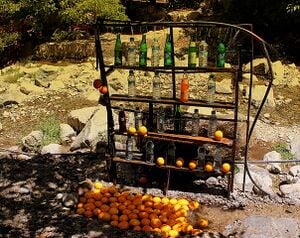The aim of this page is to recognise, celebrate and encourage the self-empowerment of community agency networks (CANs) and community groups across Morocco.

Food activism[edit | edit source]
Solar power[edit | edit source]
Solar power in Morocco is enabled by the country having one of the highest rates of solar insolation among other countries— about 3,000 hours per year of sunshine but up to 3,600 hours in the desert. Morocco has launched one of the world’s largest solar energy projects costing an estimated $9 billion. The aim of the project was to create 2,000 megawatts of solar generation capacity by 2020. The Moroccan Agency for Solar Energy (MASEN), a public-private venture, was established to lead the project. The first plant, Ouarzazate Solar Power Station, was commissioned in 2016.
Morocco has a power cable link to Europe, the Spain-Morocco interconnection, rated at 900 MW when going from Spain to Morocco and 600 MW when going from Morocco to Spain. This is the first electric interconnection built between Africa and Europe.
Wind power[edit | edit source]
In 2022, 13.48% of electricity produced in Morocco was coming from wind power. W
Climate action[edit | edit source]
Climate change is expected to significantly impact Morocco on multiple dimensions. As a coastal country with hot and arid climates, environmental impacts are likely to be wide and varied. As of the 2019 Climate Change Performance Index, Morocco was ranked second in preparedness behind Sweden. W
News and comment[edit | edit source]
2017
In Morocco, a blue tourist town is turning green, Nov 14[1]
2016
Medina bikes: Africa's first cycle-share scheme launches in Marrakech, Nov 15[2]
From BRT to tram lines, How Morocco is boosting public transport, Nov 7[3]
Morocco to give 600 mosques a green makeover, Sep 5[4]
Morocco bans plastic bags, Jul 4[5]
2015
Morocco poised to become a solar superpower with launch of desert mega-project, October 26[6]
2012
Morocco's renewable energy future - video,[7] September 20
2010
Morocco: A Charter for the Environment,[8] January 28
2009
Morocco: Here Comes the Sun,[9] November 5
Recent flooding in Morocco has prompted bloggers to air their discontent with their country's lack of sanitation infrastructure. They went around taking pictures and shooting videos, sharing scene Recent flooding in Morocco has prompted bloggers to air their discontent with their country's lack of sanitation infrastructure. They went around taking pictures and shooting videos, sharing scenes seldom broadcast by the mainstream media. More of their citizen reporting via[10] September 19
About Morocco[edit | edit source]
Morocco, officially the Kingdom of Morocco, is a country in the Maghreb region of North Africa. It overlooks the Mediterranean Sea to the north and the Atlantic Ocean to the west, and has land borders with Algeria to the east, and the disputed territory of Western Sahara to the south. Morocco also claims the Spanish exclaves of Ceuta, Melilla and Peñón de Vélez de la Gomera, and several small Spanish-controlled islands off its coast. It has a population of approximately 37 million. Islam is both the official and predominant religion, while Arabic and Berber are the official languages. Additionally, French and the Moroccan dialect of Arabic are widely spoken. The culture of Morocco is a mix of Arab, Berber, African and European cultures. Its capital is Rabat, while its largest city is Casablanca.
References
